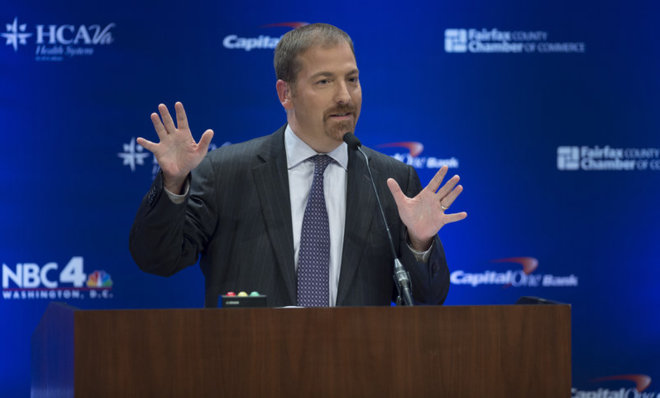5 takeaways from Chuck Todd on the Chris Christie scandal and the unifying force of Hillary Clinton


A free daily email with the biggest news stories of the day – and the best features from TheWeek.com
You are now subscribed
Your newsletter sign-up was successful
In a new episode of the Political Wire podcast, we talked with Chuck Todd, NBC's chief White House correspondent, about New Jersey Gov. Chris Christie's (R) political headaches, the potential for infighting in the two major parties, and the forces that could shape the 2014 and 2016 elections.
Here are five takeaways:
1. The political headaches for Christie are just beginning. Christie has taken a beating in the headlines over emails between aides who appeared to be discussing lane closures on a bridge as political retribution. Still, Christie for now continues to enjoy rock-solid approval ratings, and some polling suggests Americans aren't following the unfolding scandal very closely. But with multiple bodies investigating the bridge debacle and his administration's use of Hurricane Sandy relief funds, the narrative of scandal will continue for now. Said Todd: "This is not the beginning of the end — it's the end of the beginning." What's less certain is how much this hurts Christie. "At a minimum, this becomes just a thorn in the side," Todd said.
The Week
Escape your echo chamber. Get the facts behind the news, plus analysis from multiple perspectives.

Sign up for The Week's Free Newsletters
From our morning news briefing to a weekly Good News Newsletter, get the best of The Week delivered directly to your inbox.
From our morning news briefing to a weekly Good News Newsletter, get the best of The Week delivered directly to your inbox.
2. Christie's biggest political asset has become a potential liability. Part of Christie's appeal as a potential presidential candidate stems from his perceived no-nonsense, straight-talking personality. But Todd noted that politicians often experience their downfall when their biggest asset becomes a negative: "That’s something that Christie is experiencing right now." There's still nothing directly tying Christie to the lane closures. But the sensitive nature of the scandal could make Christie tighter-lipped, eroding some of that straight-talk image. Christie's political ambitions may yet survive this scandal, depending on what new findings come out and how he handles the matter. But he could sure use a more positive news story to help his cause.
3. Continuing partisanship and gridlock in Congress may alienate the middle, depressing turnout in 2014. Congress starts 2014 with an abysmal 13 percent approval rating. The public image of Congress as a polarized, dysfunctional body may only keep worsening as the parties continue grandstanding and bickering ahead of the midterm elections and as progress on hot-button items such as immigration reform languishes. The partisan sniping could rally the parties' bases but turn off independent and centrist voters, causing them to stay home in November and depressing overall turnout, Todd argued. Still, he noted a caveat to that prediction: Virginia's gubernatorial election in 2013 featured a highly divisive campaign as well, but there were no signs of such a turnout drop-off among independents and moderates.
4. Democrats can avoid major infighting between their progressive and centrist wings in 2016 if Hillary Clinton runs for president. Progressives have received a jolt of energy from the elections of New York Mayor Bill de Blasio (D) in 2013 and Sens. Elizabeth Warren (D-MA) and Tammy Baldwin (D-WI) in 2012. Some observers wonder whether progressives' growing presence in key offices, coupled with many Democrats' push for progressive policies such as a minimum-wage increase, will lead to infighting in 2016 between the party's more business-oriented centrist wing and its progressive wing. Clinton could prevent the infighting, Todd said: "You’d only see it if Hillary Clinton decided not to run."
5. President Obama's NSA reforms likely won't satisfy his critics. But they also may further bring out the GOP's national security divide. After the botched ObamaCare rollout, the National Security Agency's secret surveillance programs arguably comprised the most damaging story Obama faced in his difficult 2013. With political pressure to rein in the programs continuing, Obama is set to announce a package of reforms that will likely contain some measures from a report by a president-appointed advisory panel. The reforms, Todd explained, likely won't be sweeping, leaving NSA critics wanting more. The NSA debacle may also further bring out divisions on national security in Republican Party between the hawkish wing, led by the likes of Sens. John McCain (R-AZ) and Lindsey Graham (R-SC), and libertarian-oriented wing, led by Sen. Rand Paul (R-KY). This policy debate could spill over into the 2016 presidential nomination season.
A free daily email with the biggest news stories of the day – and the best features from TheWeek.com
Listen to the full conversation here:
For more, subscribe to Political Wire's podcast via iTunes or RSS to get episodes automatically downloaded.
Taegan D. Goddard is the founder of Political Wire, one of the earliest and most influential political websites. He also runs Wonk Wire and the Political Dictionary. Goddard spent more than a decade as managing director and COO of a prominent investment firm in New York City. Previously, he was a policy adviser to a U.S. senator and governor. Goddard is also co-author of You Won — Now What? (Scribner, 1998), a political management book hailed by prominent journalists and politicians from both parties. Goddard's essays on politics and public policy have appeared in dozens of newspapers across the country, including The Washington Post, USA Today, Boston Globe, San Francisco Chronicle, Chicago Tribune, Philadelphia Inquirer, and Christian Science Monitor. Goddard earned degrees from Vassar College and Harvard University. He lives in New York with his wife and three sons.
